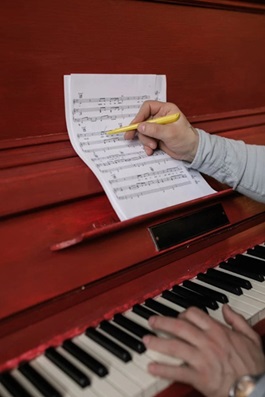Permission to Quit

Joseph Oroop: an interesting name, and it comes with an interesting story.
Both of my parents were professional musicians. They began their careers in the 1930’s during the Great Depression. My mom played the trumpet. My dad originally studied the violin but did not play very well. His parents asked his teacher what instrument he might play only moderately well and still be able to earn a living as a musician. The answer was the Voltone (French horn). They were told that it was a difficult instrument to master but there were few professional French horn players at that time, and they were greatly in demand.
Dad practiced the horn six hours a day during the summer, and three hours a day while he was in high school. His efforts paid off. He earned a job as First horn in the Washington, D.C. philharmonic when he was only 18.
With two professional-musician parents, it should come as no surprise that I was expected to play both the piano and the French horn – although not professionally. At my parents’ urging I also studied musical composition privately with Joseph Oroop. His studio was located on Barham Boulevard. All these years later, every time I pass Barham on the 101 Freeway I think of him. He taught me an important lesson.
One day after a session, Oroop confronted me. He began by saying that that I puzzled him.
“Most of my students love composition and begin working on their own original pieces. The ones who don’t drop out quickly. You’ve been studying with me for more than three months. You haven’t caught “on fire”, and you haven’t quit. You just do what I assign, nothing more, nothing less. What’s up?”
I thought about his question for a few weeks. And then I quit. I realized that I lacked the requisite passion and was clearly not destined to be a composer. To this day I believe that it takes exceptional talent to compose music. As the founder of Rattle, a literary magazine, I also think that to write poetry or music well, one must be especially gifted.
The lesson here, one we all face repeatedly in life, is when to give up.
Sometimes the answer is “Never.” But when the answer is “Soon,” you might convert that to “Now.” Is there something in your life that you are choosing to do regularly even though you don’t really like doing it? You have my permission to stop.
Unless your life partner disagrees, of course.
Alan

Comment ( 1 )